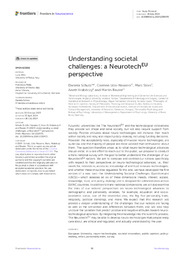Por favor, use este identificador para citar o enlazar este ítem:
https://hdl.handle.net/11000/37942Registro completo de metadatos
| Campo DC | Valor | Lengua/Idioma |
|---|---|---|
| dc.contributor.author | Schulz, Daniela | - |
| dc.contributor.author | Lillo-Navarro, Carmen | - |
| dc.contributor.author | Slors, Marc | - |
| dc.contributor.author | Hrabéczy, Anett | - |
| dc.contributor.author | Reuter, Martin | - |
| dc.contributor.other | Departamentos de la UMH::Patología y Cirugía | es_ES |
| dc.date.accessioned | 2025-11-07T09:04:17Z | - |
| dc.date.available | 2025-11-07T09:04:17Z | - |
| dc.date.created | 2024-07 | - |
| dc.identifier.citation | Frontiers in Neuroscience. 2024 Jul 26:18:1330470 | es_ES |
| dc.identifier.issn | 1662-453X | - |
| dc.identifier.issn | 1662-4548 | - |
| dc.identifier.uri | https://hdl.handle.net/11000/37942 | - |
| dc.description.abstract | Futuristic universities like The NeurotechEU and the technological innovations they provide will shape and serve society, but will also require support from society. Positive attitudes about neuro-technologies will increase their reach within society and may also impact policy-making, including funding decisions. However, the acceptability rates, especially of invasive neuro-technologies, are quite low and the majority of people are more worried than enthusiastic about them. The question therefore arises as to what neuro-technological advances should entail. In a rare eort to reach out to the public, we propose to conduct a trans-national survey with the goal to better understand the challenges of our NeurotechEU nations. We aim to compare and contrast our nations specifically with respect to their perspectives on neuro-technological advances, i.e., their needs for, interests in, access to, knowledge of and trust in neuro-technologies, and whether these should be regulated. To this end, we have developed the first version of a new tool—the Understanding Societal Challenges Questionnaire (USCQ)—which assesses all six of these dimensions (needs, interest, access, knowledge, trust, and policy-making) and is designed for administration across EU/AC countries. In addition to trans-national comparisons, we will also examine the links of our nations’ perspectives on neuro-technological advances to demographic and personality variables, for example, education and socio- economic status, size of the residential area, the Big Five personality traits, religiosity, political standings, and more. We expect that this research will provide a deeper understanding of the challenges that our nations are facing as well as the similarities and dierences between them, and will also help uncover the variables that predict positive and negative attitudes toward neuro- technological advances. By integrating this knowledge into the scientific process, The NeurotechEU may be able to develop neuro-technologies that people really care about, are ethical and regulated, and actually understood by the user. | es_ES |
| dc.format | application/pdf | es_ES |
| dc.format.extent | 8 | es_ES |
| dc.language.iso | eng | es_ES |
| dc.publisher | Frontiers Media | es_ES |
| dc.rights | info:eu-repo/semantics/openAccess | es_ES |
| dc.rights | Attribution-NonCommercial-NoDerivatives 4.0 Internacional | * |
| dc.rights.uri | http://creativecommons.org/licenses/by-nc-nd/4.0/ | * |
| dc.subject | European University | es_ES |
| dc.subject | neuro-technologies | es_ES |
| dc.subject | societal innovation | es_ES |
| dc.subject | public opinion | es_ES |
| dc.subject | policy- making | es_ES |
| dc.subject | ethics | es_ES |
| dc.subject | personality traits | es_ES |
| dc.subject | survey | es_ES |
| dc.subject.other | CDU::6 - Ciencias aplicadas::61 - Medicina | es_ES |
| dc.title | Understanding societal challenges: a NeurotechEU perspective | es_ES |
| dc.type | info:eu-repo/semantics/article | es_ES |
| dc.relation.publisherversion | https://doi.org/10.3389/fnins.2024.1330470 | es_ES |

Ver/Abrir:
Understanding societal challenges a NeurotechEU perspective.pdf
740,24 kB
Adobe PDF
Compartir:
 La licencia se describe como: Atribución-NonComercial-NoDerivada 4.0 Internacional.
La licencia se describe como: Atribución-NonComercial-NoDerivada 4.0 Internacional.
.png)